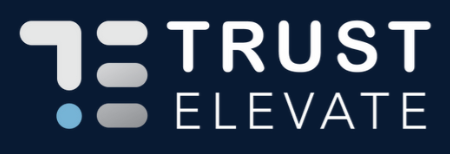Safety Policy
About TrustElevate
TrustElevate is the world’s first privacy, security and trust technology platform for handling children and young people’s data, which enables companies to comply with the CCPA, GDPR, AVMSD, PSD2, AML and hundreds of the world’s privacy and security laws. We are working toward the goal of making the internet a safer place for children online, enabling compliance with child safety regulation and tackling online harms.
TrustElevate has worked extensively with governments, the Central Bank of Ireland and other regulators, major companies and other industry stakeholders to develop our solution and further our mission. Cross-sector collaboration is crucial to the project of digital child safety. This Policy informs our role in the ecosystem and in those collaborations.
Policy statement
TrustElevate was born out of the mission of Dr Rachel O’Connell’s, the company’s founder, to make the internet a safe place for children to learn, play and grow. The founder’s training in forensic psychology, and her PhD on preventing and investigating paedophile activity online, has been brought to bear on the company in terms of fostering a culture of child-centric care.
The company and its team are committed to the safeguarding of children online, the mitigation of online harms and the enabling of digital parenting. In all instances, we are working to uphold the rights of children online and offline, as enshrined in the UN Convention on the Rights of the Child and expanded upon in later regulation, such as the General Data Protection Regulation (GDPR). We are and will continue to be mindful of the need to proactively engage with anti-discriminatory practice, giving due care to all children and young people regardless of age, gender, race, religion, sexual orientation and/or housing or care status.
The basis on which we operate entails that TrustElevate will only instate partnerships and associations with parties and persons who are aligned with our goals and seeking to eliminate online harms to children. This includes both external and internal connections: each member of TrustElevate’s team understands the mission of the company and is committed to working toward its implementation.
Framework
Article 3, paragraph 1, of the UN’s Convention on the Rights of the Child (UNCRC) (1989), gives the child the right to have his or her best interests assessed and taken into account as a primary consideration in all actions or decisions that concern him or her, both in the public and private sphere. Further, Art. 19 outlines that an assessment of the child's best interests must include consideration of the child's safety, that is, the right of the child to protection against all forms of physical or mental violence, injury or abuse (Art. 19), sexual harassment, peer pressure, bullying, degrading treatment, etc., as well as protection against sexual, economic and other exploitation, drugs, labour, armed conflict, etc. (Arts. 32-39). More recent regulation, including Article 8 of the GDPR, the age-gating requirements of the Audiovisual Media Services Directive and the UK regulator’s Age Appropriate Design Code elaborate on these rights in a digital context.
TrustElevate is committed to ongoing alignment with such regulation and the continuation of the best interests of children as our primary concern.
Over the last two decades, the perception of platforms’ role as passive or neutral conduits through which users publish content has shifted to recognise their being much more active in collating large amounts of PI, applying algorithms and predictive analytics to feed recommendation engines and ensuring advertisers reach their target audience. By means of these processes, platforms are equipped to curate and manipulate user experience to fuel the attention economy by propagating content engagement, making use of incendiary, extreme and/or harmful content to keep users on their platform. TrustElevate is providing a solution which seeks to uphold children’s rights and the special protections afforded to them in a digital environment which has been designed primarily with adults in mind. Our approach is two-pronged, involving the safeguarding of children from those (individuals and platforms) seeking to exploit them as well as the championing of the fundamental rights of children and parents seeking to exercise their duty of care.
In practice
In order to best implement our Safety Policy, TrustElevate has appointed a child protection lead whose responsibilities include safeguarding at the highest level. This involves the writing and review of child protection procedures.
In each case of onboarding a team member and/or the instatement of a partnership with another person or party, we will ensure that this Policy is read, understood and agreed to. All team members and partners will follow our child safeguarding policies and procedures. It is also vital to the ongoing development of best practice that we build a culture in which team members and partners are aware of what is expected of them and feel both comfortable about sharing concerns and that their voice and insights may inform iterations of the company’s policies and procedures.
Children and their parents and carers must also feel heard. TrustElevate is committed to creating resources for questions, concerns and positive feedback to be communicated to us. We will engage with children, young people and those caring for them regarding our safeguarding and child protection policies. The visibility of this Policy and the resources to communicate about it is critical. TrustElevate will make sure that our policies and procedures are accessible to children, young people and those responsible for them.
Roles and responsibilities
All of our team members are and will comply with this Policy document, follow our child protection procedures and conduct themselves with the best interest of children in mind. All team members are expected to report any concerns for the safety of any child and be accountable to the Child Protection Lead.
The Child Protection Lead will:
Oversee the implementation of TrustElevate’s child safeguarding policies and procedure.
Be accountable to the Board.
The Deputy Child Protection Lead will:
Support the Child Protection Lead in issues of child safeguarding
Be responsible for the reporting procedure
Code of Conduct
Values
Protect: we take a zero-tolerance approach to harm, abuse or exploitation of any kind. All decisions and actions prioritise the safety and well-being of those connected with our work.
Prevent: we aim to prevent harm through professional, responsible conduct. We take a robust approach to dealing with any breaches.
Personify: we assume individual and organisational responsibility for safeguarding and provide staff with training and guidance to fulfil their obligations.
·Partner: we maintain best practice through open, transparent dialogue with others, including the communities we serve. By listening to others, we ensure our conduct is appropriate to each context and the unique needs of those we are working with.
Positive Working Environment
I recognise that both my personal and professional conduct has the potential to damage the reputation of TrustElevate and will uphold TrustElevate’s values throughout .
I will treat all colleagues with dignity and respect.
I will not engage in or condone any form of harassment, intimidation, abuse or exploitation.
I will not engage in or condone any behaviour that is illegal or could in any way bring the organisation into disrepute.
Wherever possible, I will challenge inappropriate conduct directly. In addition, I will report all concerns to either my manager or the (Deputy) Child Safety Lead.
I understand that making intentionally false or misleading allegations against a colleague is a serious matter and could result to disciplinary action.
Safeguarding Children
I will not initiate physical contact with a child as this could be misinterpreted and cause fear or discomfort
I will never hit or otherwise physically assault or physically abuse children
I will not develop relationships with children that could in any way be deemed exploitative or abusive and will never engage in physical/sexual relationships with children
I will not act in ways that shame, humiliate, belittle or degrade children
I will not discriminate against, show differential treatment, or favour particular children to the exclusion of others.
Personal Information
I will not seek to obtain or access personal information on the communities and children TrustElevate works with unless this is strictly necessary within my role and I have authorisation to do so
I will not disclose or transfer personal information relating to children or communities engaging with TrustElevate unless authorised to do so
I will follow TrustElevate’s data protection policies and procedures when handling personal information
I will not use the organisation’s computer or other equipment to view, download, create or distribute inappropriate material (such as pornography) or material which is criminal in nature e.g. child sex abuse images.
Breaches
Compliance with TrustElevate’s Code of Conduct is mandatory under all circumstances.
All employees, volunteers, consultants, contractors and trustees have an individual responsibility to promote a safe working environment and to ensure the safety and well-being of the children and communities with whom we come into contact.
Managers, Directors and Trustees have a responsibility to model appropriate behaviour and ensure that all staff understand and comply with this Code of Conduct.
All concerns must be reported to the relevant manager or (Deputy) Child Safety Lead.
All concerns will be taken seriously and will be investigated in a timely and robust manner.
You should always follow this code of behaviour and never rely on your reputation or that of our organisation to protect you. If you have behaved inappropriately you will be subject to our disciplinary procedures. Depending on the seriousness of the situation, you may be asked to leave TrustElevate. We may also make a report to statutory agencies such as the police and/or the local authority child protection services.

